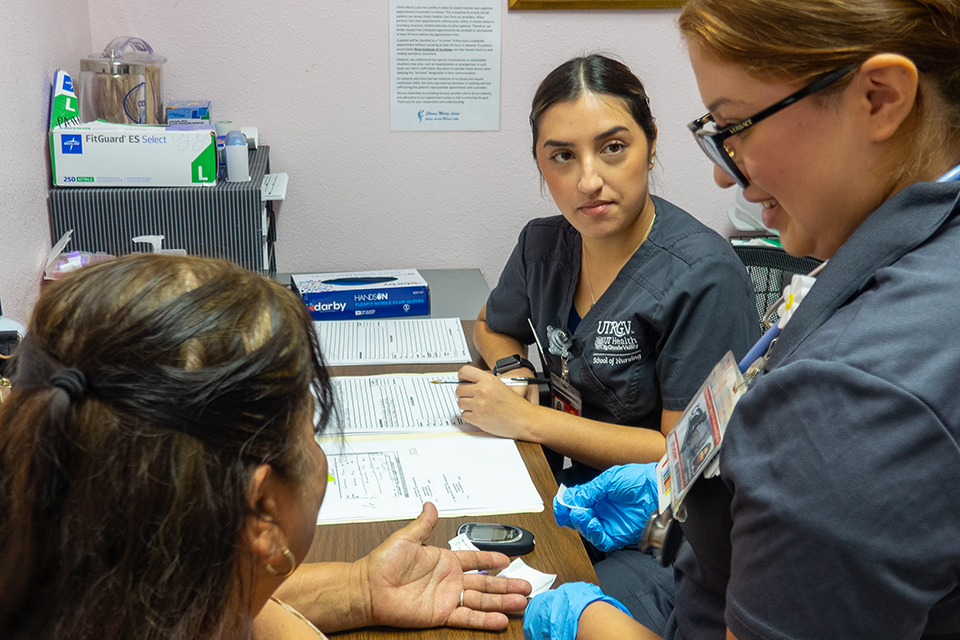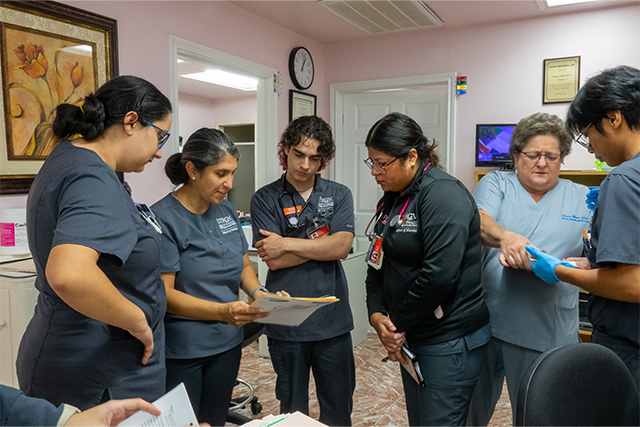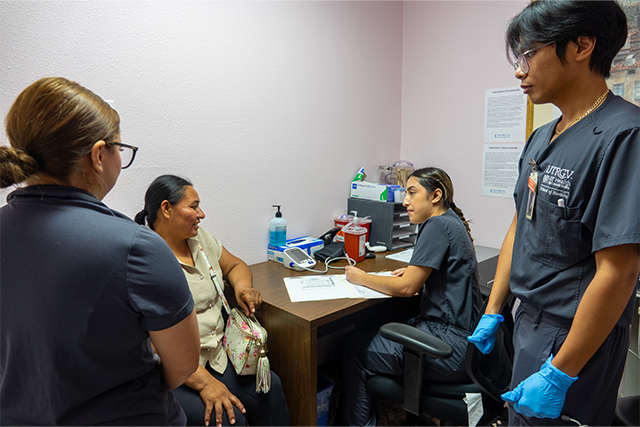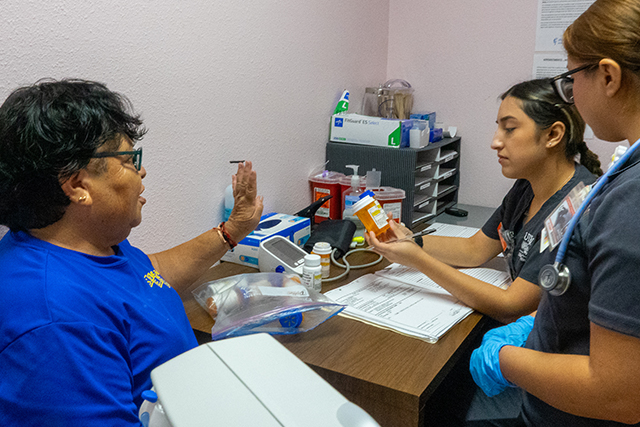
Under the supervision of clinic administrator Shirley Arnolde, UTRGV BSN student Jahzeel Martinez conducts a blood sugar test on a patient while Jasmin Miranda records the data. (UTRGV photo by Karen Villarreal)
News Release | Community, Health

Under the supervision of clinic administrator Shirley Arnolde, UTRGV BSN student Jahzeel Martinez conducts a blood sugar test on a patient while Jasmin Miranda records the data. (UTRGV photo by Karen Villarreal)
Thursday, October 23, 2025
Health
By Karen Villarreal
PEÑITAS, TEXAS – OCT. 23, 2025 – While many college students sleep in on weekends, UTRGV School of Nursing students in the NURS 4202 Community Health Clinical course get up early on Saturdays to volunteer in a community that needs them.
Two hours before a volunteer doctor is scheduled to arrive at Clinica Maria Luisa, the fourth-semester nursing students, under the supervision of their professor, start doing intake in a lobby packed with patients.
Shirley Arnolde, clinic administrator, said the students who support the clinic’s efforts are a great help.
“Our hands are reached out to the max for medical professionals to volunteer their time here,” said Arnolde, who has served at the clinic as a volunteer nurse for more than 20 years.
The clinic, located within the Proyecto Desarrollo Humano community center in Peñitas, is funded by grants and donations and is staffed entirely by volunteer nurses, doctors and dentists. They provide basic medical care at little or no cost to uninsured individuals who do not qualify for government assistance.
“It's just in my heart ever since I started nursing,” Arnolde said. “The people who volunteer also have the same kind of need I have – to serve.”

Under a memorandum of understanding between the clinic and the School of Nursing’s officially designated service learning course, students receive clinical credit for the Saturdays they spend learning and serving. They also gain hands-on clinical experience while making an immediate impact on community health.
UTRGV School of Nursing Clinical Assistant Professor Vanessa Hale, who has taught the course and supervised students since 2023, said it is important they practice triage – taking vitals, and talking to patients, whether about their medical history or post-discharge procedures.
“In caring for the patient, you have to take that objective and subjective data,” she said. “Data collection and case management are staples of nursing.”
STAPLES OF NURSING
Hale said acting as case managers differentiates the Bachelor of Science in Nursing (BSN) degree from the Associate Degree in Nursing (ADN).
“With a BSN, you look at the full determinants of health, and reduce gaps,” she said.
This means considering a patient’s lived experience – including factors such as education, income and physical environment – to provide useful and impactful health information. Students can then educate patients about available resources and other preventive health measures, like nutrition.
“It is a requirement for their Bachelor of Science in Nursing (BSN) degree that students fulfill six clinical rotations for the semester. This gives them first-hand service experience in supervised community health settings,” Hale said. “They are also required to do four hours of volunteer work. Most students choose to come in extra at the clinic to help.”
Giselle De La Garza, who volunteered at the clinic over the summer for the fourth semester of her accelerated BSN program, said she now feels better prepared for her future career.
“It's more intimate in a clinical setting,” she said. “I'm happy that we can come here and volunteer. It's in my heart to be able to help.”

COMMUNITY HEALTH PROJECTS
In addition to clinical rotations, students are required to complete a minimum of 24 hours of service-learning through a team-led community project. The projects are based on an assessment of a community’s current needs and include an engagement event that addresses those needs.
“This is a beautiful, beautiful thing,” Hale said. “At Proyecto Desarrollo Humano, the local community refers to the colonia of Pueblo De Palmas – about 2,000 residential homes.”
Students in past cohorts have hosted a women’s brunch to safely talk with women about intimate partner violence and domestic abuse issues. Another year, a “Zoomba-thon” raised awareness about community resources, and a health fair examined the health demographics of the community.
In another project, students helped the City of Peñitas educate first responders on how to use naloxone – the rescue medication for opioid overdose.
“The city had a supply of this medication but didn't know how to administer it. The clinical students did a project where they volunteered their time to train the first responders,” Hale said.
COMMUNITY OF SERVICE
The clinic’s medical professional volunteers also inspire young members of the community to pursue medical careers.
Mittzi Cantu, 21, a member of the Proyecto Desarrollo Humano community who has served in the PDH church since childhood, was invited by the nuns who noticed her spirit of service to begin volunteering at the clinic in 2022.
“I've been here since then, finding ways to help out,” said Cantu, who started with administrative tasks like scheduling appointments.
She is now completing her college basics and plans to pursue nursing.
“I'll hopefully transfer to UTRGV for the next degree,” she said. “It's been such a rewarding experience seeing the patients and being a helping hand for them.”

ABOUT UTRGV
Celebrating its 10th anniversary during the 2025-2026 academic year, The University of Texas Rio Grande Valley (UTRGV) is on a mission to transform the Rio Grande Valley, the Americas and the world. One of the country’s largest Hispanic-Serving Institutions and Seal of Excelencia certified, UTRGV has earned national recognition for its academic excellence, social mobility and student success since opening in Fall 2015. Ranked among the Best Colleges for your Tuition (and Tax) Dollars in 2025 by Washington Monthly (#7 nationally; #1 in Texas), UTRGV continues to break enrollment records, launch new academic and athletics programs and progress toward achieving R1 research status.
The only university in Texas with schools of Medicine and Podiatric Medicine, UTRGV’s regional footprint spans South Texas – with locations, teaching sites, and centers established in Edinburg, Brownsville, Rio Grande City, McAllen, Weslaco, Harlingen, Laredo, Port Isabel and South Padre Island.